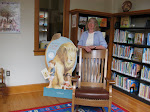I attended a
workshop on Early Literacy yesterday. Eventually the conversation came around
to Common Core Standards. Basically the speaker said, what children need to
succeed is not just reading and writing skills, but information. So curriculums
now are emphasizing content, not narrative; non-fiction, not fiction. Now, I’m a librarian, a dealer of information
in an information age – and I really have to take issue with the idea that
narrative, fiction, and story are no longer important. That it’s only content
that matters. That all we need are the facts.
Here’s the issue for
me. In a previous life, I worked in animal breeding and genetics. You know, the
people who select cows for more milk, sheep for more wool, and pigs who grow
faster. So, what does breeding cows to
give more milk have to do with reading fiction? Over the years, cows nowadays
give a lot more milk than they did even twenty years ago. And our understanding
of genetics and the technology to manipulate genetics has exploded. But here’s
the problem, sometimes the questions isn’t can we change something, can we make
it better? The real question is, do we know what better is? Because knowing how to do something, is
different from knowing what to do.
In the fifties,
short legged Herefords were all the rage. The “better” cow, if you will. Until
breeders discovered every time they selected animals with short legs they were
increasing the frequency of a lethal dwarf gene in the population. In the
sixties and seventies collies with narrow heads were considered the standard,
until breeders realized there was a relationship with narrow heads and
encephalopathies. In the eighties, long legged Suffolk sheep were consider the “best,”
until breeders realized that trait was linked to “spider leg syndrome,” a
lethal metabolic bone disorder in lambs.
Making something
better, whether it’s family life, a computer program, or the amount of milk a
cow gives, isn’t just a question that requires information. It requires
defining “better,” and defining better requires philosophy. It requires the
ability to think and reason for one self. It demands wisdom from us.
We don’t gain wisdom through acquiring information. It
doesn’t come through knowing how things
work, or how we can change them. Non-narrative non-fiction may give us the
information, but wisdom, philosophy, the ability to critically analyze issues,
comes from understanding stories.
True understanding comes from paying attention, from
understanding relationships and connections, whether between people, or between
people and the world they live in. Real knowledge requires having a philosophy
of life, having values to live by. We need to be able to make critical
inquiries, discern potential outcomes, and then make hard decisions that we can
all live with.
Those are skills that come from stories because if there
is one thing fiction or narratives teach, it’s that we live in relationship,
and those relationships matter. Stories teach us that actions have
consequences, that choices make a difference. Fiction teaches us that people
grow and change and that they should, that the choices we make today are
different from the choices we may make tomorrow, and that’s okay. As long as we
are growing, as long as we are learning, as long as we are striving to figure
out what “better” really means, we are on the road to wisdom.
We risk losing a great deal when we believe facts and
content are more important than story. There are so many important and
necessary things to be learned about living a good life that come through stories.
Things like how to make friends, how to be a better friend, how to make hard
decisions, how to live up to our values, how to develop values. What will we
lose I wonder, when we emphasize content over thought, caring, relationships,
values; when we forget that understanding how something works, isn’t the same
thing as knowing the right thing to do? That just because we can do something,
doesn’t always mean we should.
So, I’m sticking to story, my story, your story, all the
stories that line the shelves of every library in the world. Because that, I believe,
is where true knowledge and wisdom lie.

